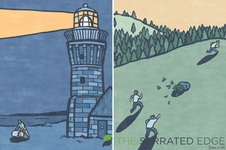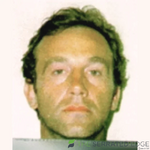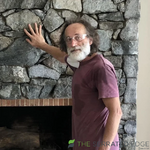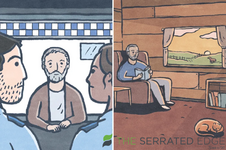PART #1
On the run in suburbia for nearly 30 years: Former fugitive ‘Dougie’ finally opens up
Harvesting a marijuana “gold mine”, being imprisoned, breaking out – then living undetected in Sydney suburbia for nearly 30 years: the remarkable tale of honours graduate turned fugitive Darko Desic.
By
Tim Elliott
NOVEMBER 15, 2024
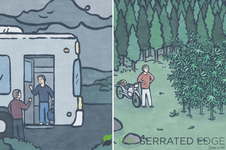
In 1988, as trouble brewed in what is now Croatia, Desic left his homeland to begin a new life in Australia. He longed to afford a house in the country – and turned to growing pot in bushland to fund his dream.
One Sunday afternoon in September 2021, a man walked into Dee Why Police Station, on Sydney’s northern beaches. He looked to be in his 60s, with a short silvery beard, neatly trimmed, and was dressed in a smart brown jacket and black jeans. “My name is Darko Desic,” he told the duty officer, in a thick eastern European accent. “I believe you’ve been looking for me.” He had escaped from prison nearly 30 years ago, he explained, and had been on the run ever since. Now he wanted to hand himself in.
Nonplussed, the officer asked for Desic’s name again.
“Darko Desic. I’ve been on
Australia’s Most Wanted. I’m here to hand myself in.”
The officer began searching for Desic on his computer. “I can’t find any trace of you,” he said.
“Please, look again,” Desic replied.
Still no results. The policeman told Desic to stay put, and disappeared into a back room. Half an hour later, he emerged with another officer, holding what appeared to be a photocopy of an old newspaper article. They looked at Desic, then at the article, then back at Desic. “He’s got the same eyebrows,” one of them said, incredulous. “That’s him,” said the other one. They took Desic to another room, where he was fingerprinted and processed. At one stage, a female inspector appeared. “You’ve done well,” she told Desic. Desic asked why. “To be on the run for that long,” she replied.
At six o’clock that evening, Desic was arrested, charged with escape from lawful custody, and driven to Sydney Police Area Command, in the city.
A few days later, details about his case began to emerge. According to police sources, the Yugoslav-born Desic had been imprisoned in Grafton Gaol, in 1991, for growing marijuana. But fearing that he would, upon his release, be deported to Yugoslavia, then in the midst of a civil war, he escaped, using a hacksaw and bolt cutters. He spent the next 29 years at large, living mostly in Avalon, on Sydney’s northern beaches, where he worked for cash, labouring and doing odd jobs. Terrified of being discovered, he didn’t apply for a driver’s licence or a bank account, and never registered with Centrelink or Medicare; when his teeth became rotten, he tried pulling them out with pliers. When the pandemic hit, his work dried up, and the house he was living in was sold. He began sleeping in the sand dunes behind the beach.
He gave himself up,as one newspaper put it, “to get a roof over his head”.
Desic’s story became global news. Journalists scrambled for interviews. Talent agents came knocking. Filmmakers got in touch: apparently Russell Crowe wanted to make a movie about him. He became a folk hero in Avalon, where locals knew him as “Dougie”. Indeed, the more famous “Dougie” became, the more friends he had. On TV, people came forward to say that they had seen him every day, walking down the main street or sitting at cafes, drinking coffee. Everyone suddenly knew him, and everybody loved him.
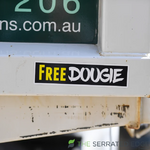
One of the “Free Dougie” bumper stickers seen on vehicles around Sydney’s northern beaches.
But most of it wasn’t true. He rarely strolled down the main street: he was scared of being spotted. And he never drank coffee: he couldn’t afford it. The truth was that no one really knew “Dougie”. How could they? He had been a virtual ghost for 30 years, living by omission and erasure. He was a feint, a gap in the narrative, hiding in plain sight, clothed in shadows and half-truths. But “Dougie” wasn’t Darko, and Darko’s story was more fascinating than any possible fiction.
“You want coffee?” Desic asks. “A cigarette? Cold water with lemon juice?” We’re sitting at the kitchen table of a timber, one-bedroom house in the country that Desic has been minding for a friend. There is a bed at one end of the room, a sink and fridge at the other, and a bathroom off to the side. “Very simple, mate,” Desic says. “This is all I need.” By his bedside is a laptop which he uses to practise coding, and, leaning against the wall in the corner, an acoustic guitar. “I taught myself classical guitar,” he tells me. He likes rock ‘n’ roll, Jeff Beck and Eric Clapton, and the blues, too. But his favourite is the 1940s gypsy-jazz guitarist, Django Reinhardt. “Django burned his hand, and he only played with two fingers, which gave him a different flavour,” Desic explains. “Impediment, he turned into advantage. Brilliant.”
Shortly after he handed himself in to police, in 2021, a court ruled that Desic serve the remaining 19 months of his sentence,
plus another two months for escaping. He was told that after that, he would most likely be deported. His lawyer, Paul McGirr, protested, telling journalists that Desic had been “a model citizen for 29 years” and that throwing him out of the country would be “un-Australian”. Besides, Yugoslavia, the country of his birth, no longer existed, having broken apart in the Balkans wars of the 1990s. After much lobbying, the government granted Desic a
permanent visa, in February, 2023. But he hasn’t been issued an Australian passport, so he can’t travel back to Croatia. “I would like to visit my family,” he says, rolling a cigarette. “It’s a long time since I see them.”
Desic was born in 1957, in a picturesque fishing village called Jablanac, on Croatia’s Adriatic Coast. “Beautiful childhood,” he says. “Best memories.” His father, Vinko, was a machinist; his mother, Anica, taught at the local school. In 1962, the couple had another son, called Predrag. When Desic was nine years old, the family moved to the port city of Rijeka, where he completed high school. Desic was a gentle kid, shy and reserved, and very bright: “I was good at writing and poetry.” But when he was 15, his mother died of breast cancer. “She was only 35,” he says. “That affected me very badly.”
After school, Desic wanted to become a professor of literature and philosophy, but at his father’s suggestion he studied engineering, graduating with honours in 1978. After that, he began his compulsory military service, training in an artillery regiment. Yugoslavia at that time was a federation of socialist republics, held together, since the end of World War II, by strongman Josip Broz Tito. “Tito was a dictator, but benevolent,” Desic says. In the army, Desic became a commissar. “That’s the guy responsible for communist education.” He was given a list of prescribed texts, none of which made much sense to him. “I realised, ‘This is like a religion. There is no substance to it ...’ But I have a gift of a gab, and I become good at it.”
In 1981, he left the army and got a job in logistics with Dow Chemical, which operated a petro-chemical facility on Krk island, off the coast from Rijeka. But his mother’s death still haunted him. “I wanted to get out of Croatia to forget about all the pain that I suffered,” he says.
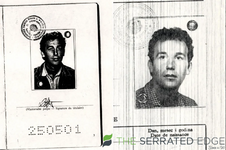
Passport photos from Desic’s immigration documents from the mid-1980s.








